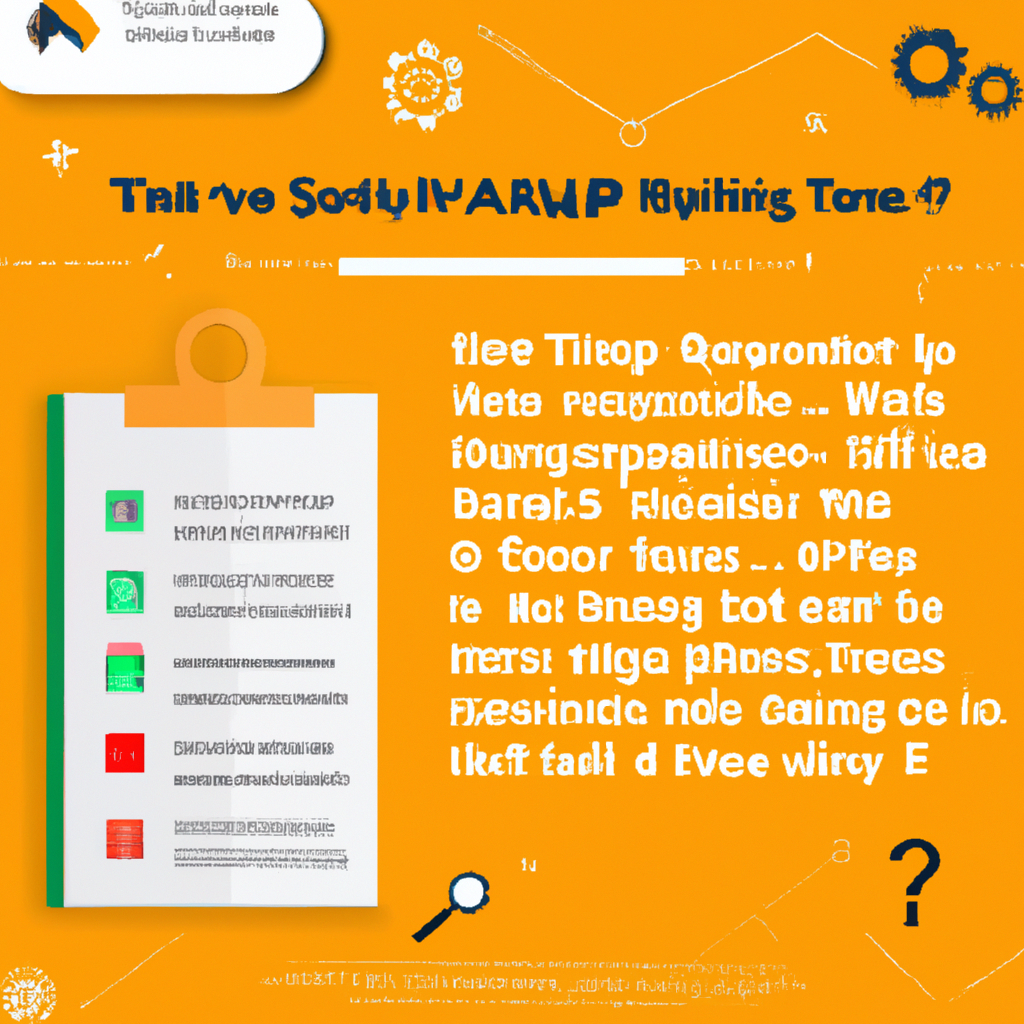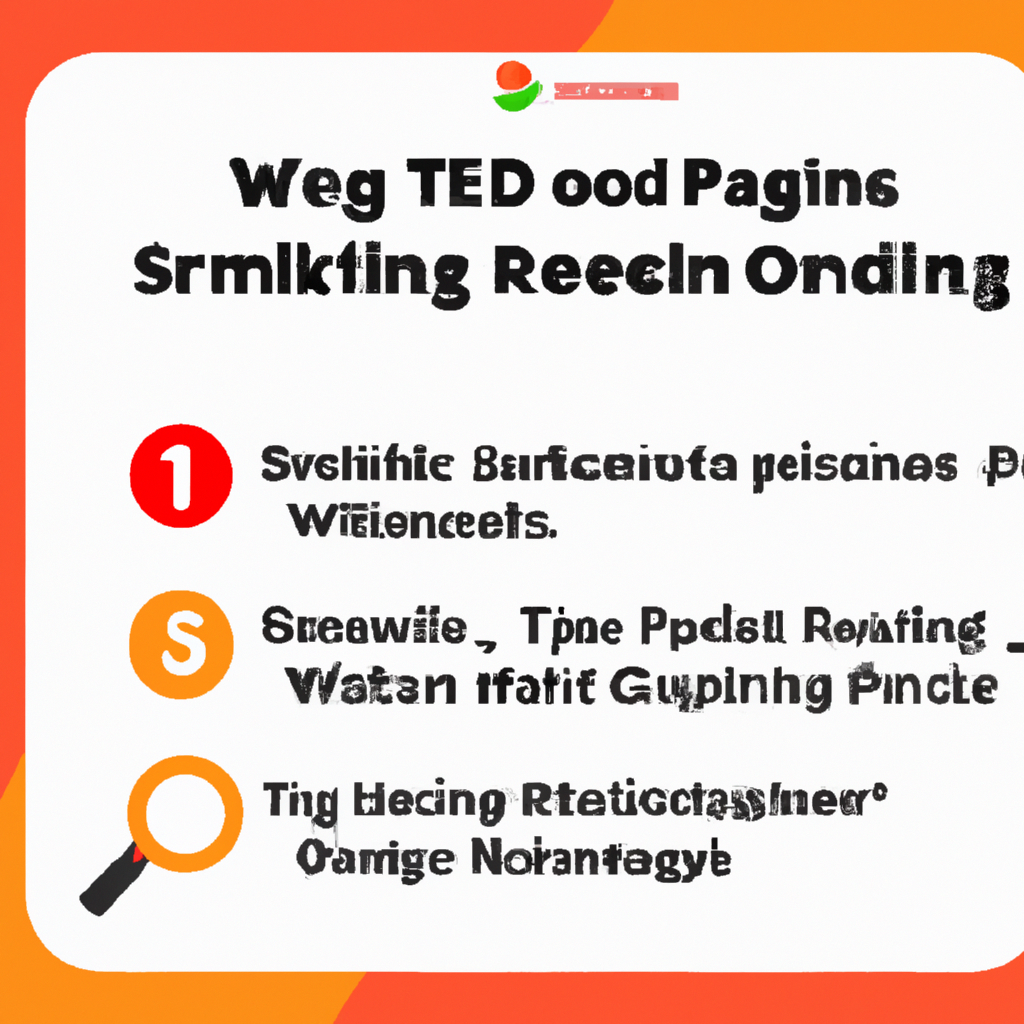Ready to take your website to new heights? Look no further! In this article, we will uncover 10 powerful SEO tips that will skyrocket your website’s ranking and increase its visibility to the world. Whether you’re a beginner or an experienced pro, these tips will equip you with the tools and techniques to conquer the ever-changing digital landscape. Get ready to optimize your website like never before and unleash its true potential. So, let’s dive in and discover the secrets of SEO success!

This image is property of images.pexels.com.
Research Your Keywords
Understand your target audience
When it comes to optimizing your website for search engines, it all starts with understanding your target audience. You need to have a clear understanding of who your audience is, what they are searching for, and what keywords they are using to find information related to your industry or niche. By knowing your audience well, you can tailor your website content and optimize it to meet their needs and expectations.
Use keyword research tools
Keyword research plays a critical role in SEO. By using keyword research tools, you can identify the most relevant and high-traffic keywords that are related to your business. These tools provide insights into search volume, competitiveness, and other relevant data to help you make informed decisions about the keywords you should target. Some popular keyword research tools include Google Keyword Planner, SEMrush, and Ahrefs.
Analyze keyword competition
Once you have a list of potential keywords, it’s important to analyze the competition for those keywords. This will give you an understanding of how difficult it will be to rank for each keyword. Look at factors such as the number of websites targeting the same keyword, the authority of those websites, and the quality of their content. Choose keywords that have a moderate level of competition and that are relevant to your business to increase your chances of ranking well in search results.
Optimize Your Website Structure
Create user-friendly navigation
A user-friendly navigation structure is essential for both users and search engines. Your website should have a logical and intuitive navigation menu that allows visitors to easily find the information they are looking for. Avoid using complicated menus or dropdowns that may confuse users. A well-organized and user-friendly navigation structure can improve the user experience and encourage visitors to stay longer on your website.
Organize your content with headings
Using headings to organize your content not only helps users navigate your website but also improves your SEO. Search engines analyze your heading tags to understand the structure and hierarchy of your content. Make sure to use descriptive headings that accurately represent the content of each section. Use heading tags (H1, H2, H3, etc.) in a hierarchical manner, with the main heading (H1) representing the main topic of the page.
Optimize URL structure
Your website’s URL structure should be clean, descriptive, and easy to read. Use relevant keywords in your URLs to provide both users and search engines with a clear understanding of what the page is about. Avoid using generic URLs with random alphanumeric strings. Instead, create URLs that include relevant keywords and accurately reflect the content of the page. This will not only improve your SEO but also make your URLs more user-friendly and shareable.
Write High-Quality Content
Focus on valuable and relevant information
When it comes to content, quality is key. Your website should provide valuable and relevant information that meets the needs of your target audience. Focus on creating informative and comprehensive content that answers common questions and addresses common pain points in your industry. Make sure your content is well-researched, original, and provides a unique perspective on the topic. The more valuable your content is, the more likely it is to attract and engage users, as well as obtain high rankings in search results.
Include target keywords naturally
While it’s important to include target keywords in your content, it’s equally important to do so naturally. Stuffing your content with keywords can negatively impact the user experience and may even lead to penalties from search engines. Instead, aim for a natural integration of keywords throughout your content. Focus on using keywords in the page title, headings, and within the body of the content in a way that flows naturally and provides value to the reader.
Use engaging titles and headings
Titles and headings play a crucial role in capturing the attention of users and search engines. Use engaging and descriptive titles that accurately represent the content of the page and entice users to click. Incorporate relevant keywords in your titles and headings to improve your SEO. Additionally, consider using different heading tags (H1, H2, H3) to structure your content and make it more scannable for both users and search engines.
Optimize Page Titles and Meta Descriptions
Craft unique and descriptive page titles
Page titles are one of the most important on-page SEO elements. Each page on your website should have a unique and descriptive title that accurately represents the content of the page. Incorporate your target keywords in the page titles to improve your visibility in search results. Keep your titles concise and compelling, as they serve as the first impression for users in search engine listings.
Write compelling meta descriptions
While meta descriptions don’t directly impact your search engine rankings, they are crucial for improving click-through rates and attracting users to your website. Each page should have a unique and compelling meta description that summarizes the content of the page and entices users to click. Incorporate your target keywords in the meta descriptions, but remember to keep them concise and engaging. A well-crafted meta description can significantly impact your website’s click-through rate.
Include target keywords
Both page titles and meta descriptions provide an opportunity to include your target keywords. Incorporating relevant keywords in these elements helps search engines understand the topic of your page and improves your visibility in search results. However, avoid keyword stuffing and prioritize providing descriptive and engaging information to both search engines and users. Use keywords naturally and strategically in your titles and meta descriptions for optimal SEO benefits.

This image is property of images.pexels.com.
Optimize Image Alt Texts
Add descriptive alt texts to images
Alt text, also known as alternative text, is used to describe the content of an image. It is essential for providing accessibility to visually impaired users and helps search engines understand the context of the image. When adding alt text to your images, make sure to provide descriptive and accurate descriptions that convey the meaning and purpose of the image. This not only enhances the user experience but also improves your SEO.
Include target keywords in alt texts
Just like with other elements of your website, including target keywords in alt texts can help improve your visibility in search results. However, it’s crucial to strike a balance between optimizing for search engines and providing meaningful alt text for users. Incorporate relevant keywords in your alt texts, but only if they accurately describe the image. Focusing on providing descriptive alt text that adds value for users should always be the priority.
Use clear and relevant image filenames
When naming your image files, be sure to use clear and relevant filenames that accurately describe the content of the image. Avoid generic filenames like “image001.jpg” and instead use descriptive filenames that include relevant keywords. This not only helps search engines understand the image but also improves the overall user experience. Clear and relevant image filenames make it easier for users to find and share your images.
Improve Website Loading Speed
Optimize image sizes
Images can significantly impact your website’s loading speed. Optimizing image sizes by compressing them without compromising quality can help reduce the file size and improve loading times. Use image compression tools or plugins to optimize your images before uploading them to your website. Additionally, consider using the appropriate file format for each image (such as JPEG for photographs and PNG for transparent images) for optimal performance.
Enable browser caching
Enabling browser caching allows your website to store data on a user’s device to speed up future visits. When a user revisits your website, instead of downloading all files again, their browser can retrieve and load cached files, resulting in faster loading times. Enable browser caching by adding caching directives to your website’s server configuration or by utilizing caching plugins depending on your content management system.
Minify CSS and JavaScript files
Minifying CSS and JavaScript files involves removing unnecessary spaces, line breaks, and comments to reduce file size. This optimization technique can significantly improve your website’s loading speed. Use minification tools or plugins to automatically minify your CSS and JavaScript files. However, be cautious and ensure that the minification process doesn’t break any functionality on your website. Regularly test your website after minifying to ensure everything works as expected.

This image is property of images.pexels.com.
Build High-Quality Backlinks
Create valuable and shareable content
Creating high-quality, valuable content is one of the most effective ways to attract backlinks from other websites. When you provide valuable and informative content that stands out from the competition, other website owners, bloggers, and industry influencers are more likely to link to your content as a resource. Focus on creating comprehensive, well-researched, and unique content that offers something valuable to your target audience, and you’ll naturally attract backlinks.
Guest post on reputable websites
Guest posting on reputable websites within your industry or niche can help you build high-quality backlinks. Look for websites that accept guest posts and have a good reputation in terms of content quality and authority. When guest posting, ensure that your content is relevant and valuable to the host website’s audience. Include links back to your own website within your guest post, either within the content or in the author bio section.
Participate in industry forums and communities
Engaging with industry forums and online communities is not only a great way to build relationships and establish yourself as an authority, but it can also lead to valuable backlinks. Contribute to discussions, answer questions, and provide value to the community. When appropriate, include links to relevant pages on your website as a resource. However, avoid spamming or overly promoting your own content as this can harm your reputation and backlink potential.
Optimize for Mobile Devices
Use a responsive design
With the increasing number of users accessing the internet via mobile devices, having a responsive design is essential for SEO. A responsive design allows your website to adapt and display content properly on different screen sizes and devices. This ensures a positive user experience for mobile users and helps search engines understand that your website is mobile-friendly. Responsive design eliminates the need for separate mobile and desktop versions of your website, making it easier to manage and maintain.
Optimize page layout for mobile
Optimizing your page layout for mobile involves ensuring that your content is easily readable and accessible on smaller screens. Use legible font sizes, appropriate spacing, and clear calls to action on your mobile pages. Consider how your content is organized and prioritize the most important information for mobile users. By optimizing your page layout for mobile, you can enhance the user experience and encourage mobile visitors to stay on your website.
Ensure fast loading on mobile devices
Mobile users expect fast loading times, and search engines prioritize websites that offer a seamless mobile experience. To ensure fast loading on mobile devices, optimize your images, enable browser caching, and minimize CSS and JavaScript files as mentioned earlier. Additionally, regularly test your website’s performance on various mobile devices and optimize accordingly. A fast-loading website not only improves user experience but also encourages users to stay on your site and decreases bounce rates.

Monitor and Analyze Your Website’s Performance
Set up Google Analytics
Google Analytics is a powerful tool that provides insights into the performance of your website. By setting up Google Analytics, you can track important metrics such as website traffic, user behavior, and conversion rates. This data allows you to make informed decisions about your SEO strategy and identify areas for improvement. Regularly monitor your website’s performance in Google Analytics to gauge the effectiveness of your optimization efforts.
Track keyword rankings
Monitoring your keyword rankings is crucial to understanding how well your SEO efforts are working. Track the rankings of your target keywords to see if your website is moving up or down in search results. There are various keyword tracking tools available that can provide you with accurate and up-to-date ranking data. Analyze this data to identify trends and make necessary adjustments to your SEO strategy.
Analyze user behavior on-site
Understanding how users behave on your website can help you optimize your website for better engagement and conversion rates. Analyze user behavior metrics such as bounce rate, time on page, and pages per session to gain insights into how users interact with your content. Identify pages with high bounce rates and low engagement and optimize them to provide a better user experience. By regularly analyzing user behavior, you can make data-driven decisions to improve your website’s performance.
Keep Up with SEO Trends
Follow industry blogs and forums
Staying updated with the latest SEO trends requires active participation in the SEO community. Follow industry-leading blogs, forums, and communities to stay informed about the latest developments in SEO. These resources often provide valuable insights, tips, and updates on search engine algorithm changes, best practices, and case studies. Engage with other professionals in the SEO field, ask questions, and share your own knowledge and experiences.
Stay updated with algorithm changes
Search engine algorithms are constantly evolving, and staying updated with algorithm changes is crucial for maintaining and improving your website’s rankings. Search engines like Google often announce major algorithm updates that can significantly impact search rankings. Stay informed about algorithm changes through official announcements and reliable industry sources. Understanding how algorithms work and keeping up with changes allows you to adapt your SEO strategy accordingly.
Adapt your strategy accordingly
As the SEO landscape evolves, it’s essential to adapt your strategy accordingly. Use the knowledge gained from research, analysis, and staying updated with the latest trends to refine and optimize your SEO approach. Continuously monitor your website’s performance, experiment with different techniques, and adjust your optimization efforts as needed. By embracing change and adapting your strategy, you can stay ahead of the curve and maintain a competitive edge in search engine rankings.
In conclusion, implementing these SEO tips can greatly improve your website’s ranking in search engine results. By understanding your target audience, optimizing your website structure, crafting high-quality content, optimizing page titles and meta descriptions, optimizing image alt texts, improving website loading speed, building high-quality backlinks, optimizing for mobile devices, monitoring and analyzing website performance, and keeping up with SEO trends, you’ll be well on your way to achieving better search engine visibility and attracting more organic traffic to your website.

